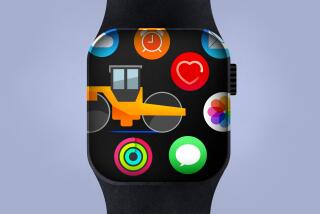Core Issues for Apple in the New Year
- Share via
For Apple, 1996 was the corporate equivalent of a system crash and restart. A year ago, the papers were rife with rumors of who would buy Apple for a fire-sale price before the company went down in flames, as did a couple of batteries in its PowerBooks.
As usual, rumors of Apple’s demise proved premature. Defying naysayers yet again, Apple is making it to 1997 with a modest head of steam--a small third-quarter profit, optimistic holiday sales reports and the return of the prodigal son, Steve Jobs. The worst may not be over, but credit Apple with four key moves this year:
* Adult supervision returned in the form of CEO Gilbert Amelio, who unlike his predecessor seems to understand how to run a big company.
* Most Macs became price-competitive with Windows machines.
* Macs got faster. They now perform as fast or faster than comparably priced Intel-based boxes and should keep pace--or set the pace--in 1997.
* Apple discovered the Internet, making every new Mac more Internet-friendly than a Windows computer.
Still, the new year begs for soul-searching. That’s not Apple’s strong suit, so I’ve taken the liberty of doing it for them. Here are four things the company must focus on in 1997:
Fix the OS mess.
In case you have a life and haven’t spent the entire year tracking Apple’s travails: The Mac OS lacks certain modern features that it must offer soon. Those include the ability to do several jobs (such as send e-mail, print and recalculate a spreadsheet) simultaneously without a performance hit, and the ability to protect the OS from crashing when a single application hangs.
Apple’s engineering corps, beset by defections, doesn’t have a clue how to fix things. Enter the brilliant but unpredictable Jobs. With the recent announcement that Apple will acquire his Next Computer, and with it a more modern OS that features some of what the Mac OS lacks, hope springs anew.
Now that Apple has new technology, it should offer a realistic time frame for revamping the Mac OS, devote the resources required to meet that deadline, then announce the plan publicly. Honesty for a change--what a concept.
What if engineers or executives suffer from Apple’s rampant not-invented-here syndrome and resist integrating Next technology and whatever else Apple must buy to keep the Mac current? Fire them. If not, they’ll kill the Mac.
Find some big cloners.
Apple needs at least two companies among the top 15 PC makers or one in the top five to announce that they will sell Mac clones by June. A Compaq or Gateway might make software developers believe in the Mac again.
Along these lines, in 1996 Apple devoted $20 million to developer support. If Amelio really wants to stop developer desertions, he’ll spend $50 million in 1997.
Let Claris be Claris.
Claris, Apple’s sensationally successful software company, has proved that it can steamroll the competition. Mac and Windows versions of its Home Page, FileMaker and Emailer products put the competition to shame. In short, Claris, like its superb all-in-one productivity program, Works. So instead of making Claris support ill-considered ventures that spread Apple too thin, let it spend its vast profit to build new products, grow and demonstrate that Apple has a clue about how to survive as a software company.
Hold onto the schools.
Years ago Apple donated thousands of computers to schools, engendering deep loyalty among teachers, grabbing a dominant market share and leading millions of students to become Mac fanatics. To stay strong in the schools Apple needs a new initiative. I call it “Kids First 2000.”
Apple should give away 2,000 Macs--including an Internet server for every 20 desktop models--to public schools every month between now and 2000. It should throw in a geek SWAT team to wire 2,000 schools, and build technologies designed to help schools administer Web activities.
Apple management has never been stupid, just scattered between too many priorities. No time like the new year to choose survival.
*
Charles Piller can be reached via e-mail at cpiller@aol.com






